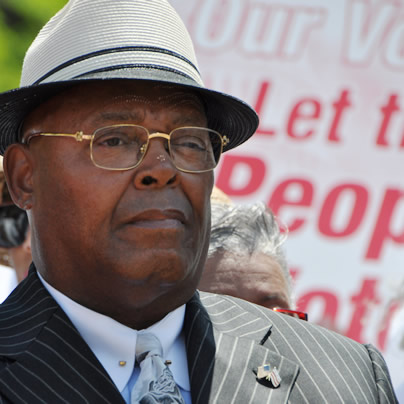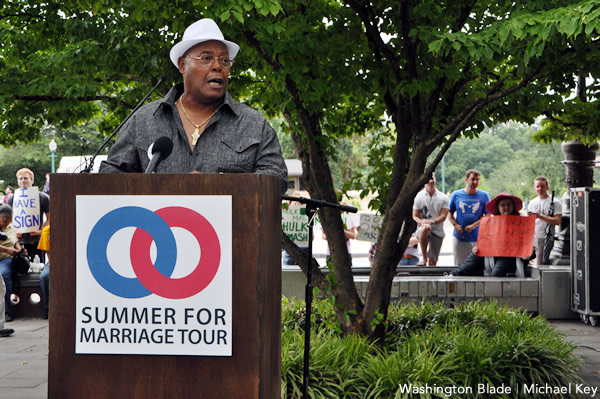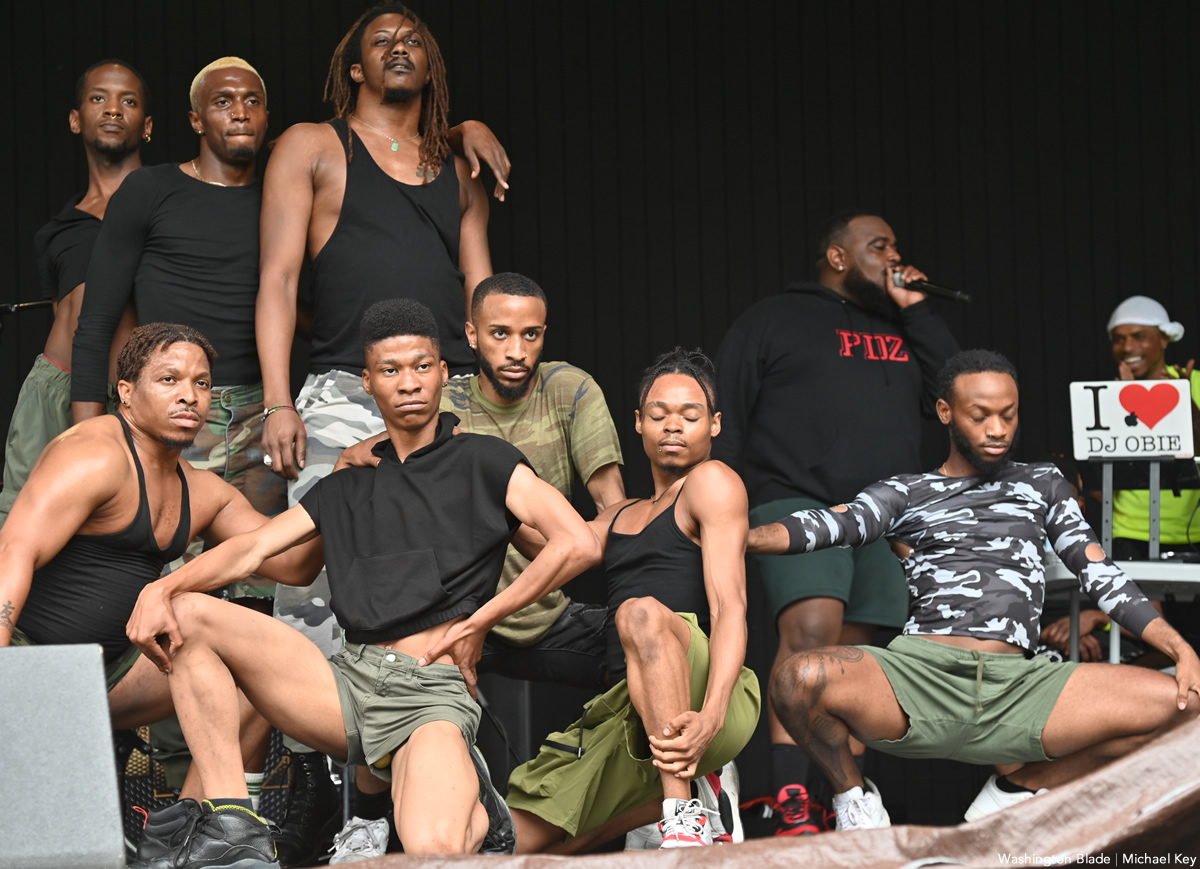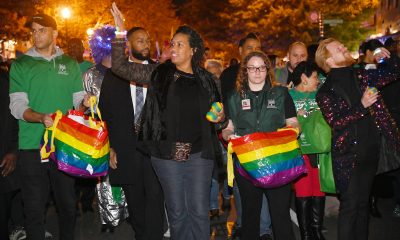Local
Anti-gay consultant working for Gray campaign
Former NOM official King hired to transport senior citizens to polls


Vincent Gray’s campaign manager says Robert King is ‘not a political adviser’ to the campaign. (Washington Blade file photo by Michael Key)
A Ward 5 Advisory Neighborhood Commissioner who was paid by an anti-gay group in 2010 to work on the unsuccessful effort to overturn D.C.’s same-sex marriage law in a voter referendum is working for Mayor Vincent Gray’s re-election campaign as a get-out-the-vote consultant aimed at senior citizens.
Chuck Thies, Gray’s campaign manager, said he hired Robert “Bob” King to assist with the effort to transport senior citizens to the polls on the day of the city’s April 1 Democratic primary.
“Bob is not a political adviser to this campaign,” Thies told the Blade. “He has no influence whatsoever on public policy, internal policy, or strategy — nothing — zero,” said Thies.
Instead, King, who has had ties to the city’s senior citizen community for more than 30 years, will organize logistics to transport mostly low-income seniors to the polls by bus on Election Day, Thies said.
King’s role as a paid consultant in 2010 for the National Organization for Marriage, which opposes same-sex marriage, surfaced last April when he emerged as an early supporter of the mayoral campaign of D.C. Council member Muriel Bowser (D-Ward 4). The Bowser campaign at the time listed King as a member of the host committee for the campaign’s kick-off celebration and fundraiser.
In a telephone interview on Tuesday, King said he’s been a longtime friend of the Bowser family and decided to support Bowser for mayor before Gray announced he was running for a second term, believing Bowser was the best candidate at that time.
However, he said the Bowser campaign never responded to a proposal he submitted last spring to do get-out-the vote work targeting senior citizens for her campaign. So after Gray announced his candidacy in December and Gray supporters approached him to organize Gray’s senior citizen outreach effort he decided to join the Gray campaign, King said.
“I looked around and I said the lowering crime rate, the improvement in the schools, the bond ratings – and I thought he had done a great job in advancing Mayor Williams and Mayor Fenty’s blueprint” for the city were factors that prompted him to switch his support to Gray, King said.
The Gray campaign’s Jan. 31 report filed with the D.C. Office of Campaign Finance shows that the campaign paid King $2,500 on Jan. 8 for his services during the campaign’s first reporting period.
King told the Blade last April, at the time he was supporting Bowser, that he has never taken a public position for or against the city’s same-sex marriage law. He said he was retained as a consultant by the National Organization for Marriage to coordinate a campaign to place the marriage law on the ballot in a referendum.
“My position was to give the people the right to vote on the issue,” he said. “My personal view is not the issue. The issue was democracy and whether the people should be given the right to vote.”
Rick Rosendall, president of the Gay and Lesbian Activists Alliance, said at the time that King and others who clearly opposed marriage equality for same-sex couples have sought to “hide behind the ‘let the people vote mantra’ in their efforts to kill same-sex marriage laws in D.C. and elsewhere.
“The fact is that no other people’s rights are put to a plebiscite,” Rosendall said.
Thies noted that Gray is a strong supporter of marriage equality and LGBT rights and has taken heat from clergy members and many residents – including black senior citizens – for his outspoken advocacy for gay marriage.
“And so when it comes to Mayor Gray’s position on same-sex marriage and other LGBT issues, I don’t think anyone can question his commitment and his dedication to equal rights,” Thies said.
According to Thies, King told him he now accepts the city’s marriage equality law as the “law of the land.”
“I talked to him before I hired him,” said Thies. “I said Bob, I have a problem with this and you need to address this. And he said that’s the past. I accept the law and that is the status quo now.”
King reiterated that on Tuesday, saying he’s interested in meeting with representatives of the LGBT community to open the door to working together on future projects. He said he’s also doing senior citizen outreach on behalf of the re-election campaigns of D.C. Council Chair Phil Mendelson (D-At-Large) and Council member Kenyan McDuffie (D-Ward 5).
“They are marriage equality supporters and I am working with them,” he said.
Thies said King’s efforts to arrange transportation for senior citizens to the polls will be open to everyone regardless of who they are supporting for mayor.
“We will hire buses and bring them to the senior centers and anyone can board them, including someone wearing a sticker that belongs to one of our opponents,” he said.
District of Columbia
New D.C. LGBTQ+ bar Crush set to open April 19
An ‘all-inclusive entertainment haven,’ with dance floor, roof deck

D.C.’s newest LGBTQ+ bar called Crush is scheduled to open for business at 4 p.m. on Friday, April 19, in a spacious, two-story building with a dance floor and roof deck at 2007 14th St., N.W. in one of the city’s bustling nightlife areas.
A statement released by co-owners Stephen Rutgers and Mark Rutstein earlier this year says the new bar will provide an atmosphere that blends “nostalgia with contemporary nightlife” in a building that was home to a popular music store and radio supply shop.
Rutgers said the opening comes one day after Crush received final approval of its liquor license that was transferred from the Owl Room, a bar that operated in the same building before closing Dec. 31 of last year. The official opening also comes three days after Crush hosted a pre-opening reception for family, friends, and community members on Tuesday, April 16.
Among those attending, Rutgers said, were officials with several prominent local LGBTQ organizations, including officials with the DC Center for the LGBTQ Community, which is located across the street from Crush in the city’s Reeves Center municipal building. Also attending were Japer Bowles, director of the Mayor’s Office of LGBTQ Affairs, and Salah Czapary, director of the Mayor’s Office of Nightlife and Culture.
Rutgers said Crush plans to hold a grand opening event in a few weeks after he, Rutstein and the bar’s employees become settled into their newly opened operations.
“Step into a venue where inclusivity isn’t just a promise but a vibrant reality,” a statement posted on the Crush website says. “Imagine an all-inclusive entertainment haven where diversity isn’t just celebrated, it’s embraced as the very heartbeat of our venue,” the statement says. “Welcome to a place where love knows no bounds, and the only color or preference that matters is the vibrant tapestry of humanity itself. Welcome to Crush.”
The website says Crush will be open Tuesdays and Wednesdays from 4 p.m. to 12 a.m., Thursdays from 4 p.m. to 2 a.m., Fridays from 4 p.m. to 3 a.m., Saturdays from 2 p.m. to 3 a.m., and Sundays from 2 p.m. to 12 a.m. It will be closed on Mondays.
Crush is located less than two blocks from the U Street Metro station.
District of Columbia
Reenactment of first gay rights picket at White House draws interest of tourists
LGBTQ activists carry signs from historic 1965 protest

About 30 LGBTQ activists formed a circular picket line in front of the White House Wednesday afternoon, April 17, carrying signs calling for an end to discrimination against “homosexuals” in a reenactment of the first gay rights protest at the White House that took place 59 years earlier on April 17, 1965.
Crowds of tourists looked on with interest as the activists walked back and forth in silence in front of the White House fence on Pennsylvania Avenue. Like the 1965 event, several of the men were dressed in suits and ties and the women in dresses in keeping with a 1960s era dress code policy for protests of the Mattachine Society of Washington, D.C., the city’s first gay rights group that organized the 1965 event.
Wednesday’s reenactment was organized by D.C.’s Rainbow History Project, which made it clear that the event was not intended as a protest against President Joe Biden and his administration, which the group praised as a strong supporter of LGBTQ rights.
“I think this was an amazing event,” said Vincent Slatt, the Rainbow History Project official who led efforts to put on the event. “We had twice as many that we had hoped for that came today,” he said.
“It was so great to see a reenactment and so great to see how far we’ve come,” Slatt said. “And also, the acknowledgement of what else we still need to do.”
Slatt said participants in the event who were not carrying picket signs handed out literature explaining the purpose of the event.
A flier handed out by participants noted that among the demands of the protesters at the 1965 event were to end the ban on homosexuals from working in the federal government, an end to the ban on gays serving in the military, an end to the denial of security clearances for gays, and an end of the government’s refusal to meet with the LGBTQ community.
“The other thing that I think is really, really moving is some of the gay staff inside the White House found out this was happening and came out to greet us,” Slatt said. He noted that this highlighted how much has changed since 1965, when then President Lyndon Johnson’s White House refused to respond to a letter sent to Johnson from the Mattachine Society explaining its grievances.
“So now to have gay people in the White House coming out to give us their respects and to say hello was especially meaningful to us,” Slatt said. “That was not expected today.”
Among those walking the picket line was longtime D.C. LGBTQ rights advocate Paul Kuntzler, who is the only known surviving person who was among the White House picketers at the April 1965 event. Kuntzler said he proudly carried a newly printed version of the sign at Wednesday’s reenactment event that he carried during the 1965 protest. It stated, “Fifteen Million Homosexuals Protest Federal Treatment.”
Also participating in the event was Japer Bowles, director of D.C. Mayor Muriel Bowser’s Office of LGBTQ Affairs. Bowles presented Slatt with a proclamation issued by Bowser declaring April 17, 2024, Mattachine Society Day in Washington, D.C.
“Whereas, on April 17, 1965, the Mattachine Society of Washington courageously held the nation’s inaugural picket for gay rights, a seminal moment in the ongoing struggle for LGBTQIA+ equality in the United States, marking the genesis of public demonstrations advocating for those rights and paving the way for Pride Marches and Pride celebrations worldwide,” the proclamation states.
About 30 minutes after the reenactment event began, uniformed Secret Service agents informed Slatt that due to a security issue the picketers would have to move off the sidewalk in front of the White House and resume the picketing across the street on the sidewalk in front of Lafayette Park. When asked by the Washington Blade what the security issue was about, one of the Secret Service officers said he did not have any further details other than that his superiors informed him that the White House sidewalk would have to be temporarily cleared of all people.
Participants in the event quickly resumed their picket line on the sidewalk in front of Lafayette Park for another 30 minutes or so in keeping with the 1965 picketing event, which lasted for one hour, from 4:20 p.m. to 5:20 p.m., according to Rainbow History Project’s research into the 1965 event.
Although the LGBTQ picketers continued their procession in silence, a separate protest in Lafayette Park a short distance from the LGBTQ picketers included speakers shouting through amplified speakers. The protest was against the government of Saudi Arabia and organized by a Muslim group called Al Baqee Organization.
A statement released by the Rainbow History Project says the reenactment event, among other things, was a tribute to D.C.-area lesbian rights advocate Lilli Vincenz, who participated in the 1965 White House picketing, and D.C. gay rights pioneer Frank Kameny, who founded the Mattachine Society of Washington in the early 1960s and was the lead organizer of the 1965 White House protest. Kameny died in 2011 and Vincenz died in 2023.
The picket signs carried by participants in the reenactment event, which were reproduced from the 1965 event, had these messages:
• “DISCRIMINATION Against Homosexuals is as immoral as Discrimination Against Negroes and Jews;”
• “Government Should Combat Prejudice NOT PROMOTE IT”
• “White House Refuses Replies to Our Letters, AFRAID OF US?
• “HOMOSEXUALS Died for their Country, Too”
• “First Class Citizenship for HOMOSEXUALS”
• “Sexual Preference is Irrelevant to Employment”
• “Fifteen Million U.S. Homosexuals Protest Federal Treatment”
District of Columbia
Organizers announce details for D.C. Black Pride 2024
Most events to take place Memorial Day weekend at Westin Downtown

The Center for Black Equity, the organizer of D.C. Black Pride, the nation’s first and one of the largest annual African-American LGBTQ Pride celebrations, announced this year’s event will take place Memorial Day Weekend from May 24-27.
The announcement, released April 16, says that most 2024 D.C. Black Pride events will take place at the Westin Washington, D.C. Downtown Hotel at 999 9th St, N.W.
“With the theme Black Pride Forever, the event promises a weekend filled with vibrant celebrations, empowering workshops, and a deep exploration of Black LGBTQIA+ history and culture,” the announcement says.
It says events will include as in past years a “Rainbow Row” vendor expo at the hotel featuring “organizations and vendors created for and by the LGBTQIA+ community” offering products and services “that celebrate Black excellence.”
According to the announcement, other events include a Health and Wellness Festival that will offer workshops, demonstrations, and activities focused on “holistic well-being;” a Mary Bowman Poetry Slam “showcasing the power and beauty of spoken word by Black LGBTQIA+ artists;” the Black Pride Through the Decades Party, that will celebrate the “rich history of the Black LGBTQIA+ movement;” and an Empowerment Through Knowledge series of workshops that “delve into various topics relevant to the Black LGBTQIA+ community.”
Also, as in past years, this year’s D.C. Black Pride will feature its “Opening Night Extravaganza” reception and party that will include entertainment and live performances.
The announcement notes that D.C.’s annual Black Pride celebration, started in 1991 as a one-day outdoor event at Howard University’s Banneker Field, has inspired annual Black LGBTQ Pride events across the United States and in Canada, United Kingdom, Brazil, Africa, and the Caribbean. More than 300,000 people attend Black LGBTQ Pride events each year worldwide, the announcement says.
Full details, including the official schedule of events, can be accessed at dcblackpride.org.
-

 Africa4 days ago
Africa4 days agoCongolese lawmaker introduces anti-homosexuality bill
-

 District of Columbia14 hours ago
District of Columbia14 hours agoReenactment of first gay rights picket at White House draws interest of tourists
-

 World4 days ago
World4 days agoOut in the World: LGBTQ news from Europe and Asia
-

 Arizona18 hours ago
Arizona18 hours agoAriz. governor vetoes anti-transgender, Ten Commandments bill








